SHTF: Prepping: How To Prepare Your Car In Case You Have To Live In It
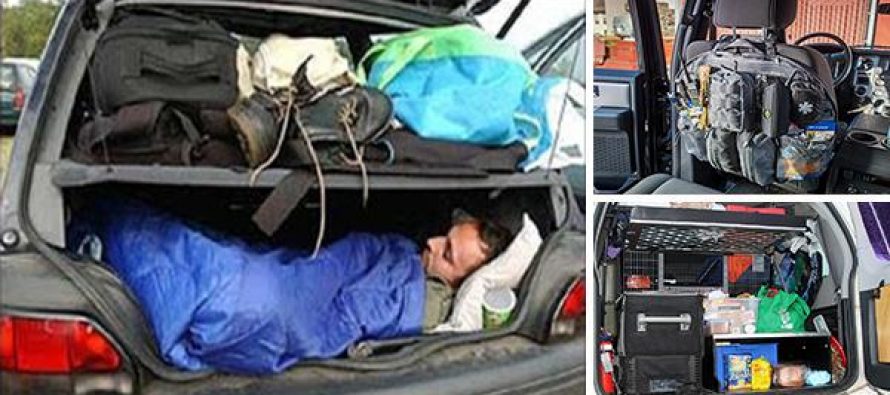
Living out of a vehicle is never an ideal circumstance. In a perfect world, you would purchase a truck, SUV, or a van, which you will modify and customize to maximize the comfort and use of space. We do not live in a perfect world, and whichever vehicle you are currently driving may end up being your home on wheels. So what can you do to prepare your current car in the unfortunate event that you may be forced to call it “home”?
There are a lot of articles written about living out of a car. This one aims to provide a few tips and things to think of that may not have crossed your mind.
Related: 15+ Survival Items To Keep In Your Car At All Times For SHTF
Preparation
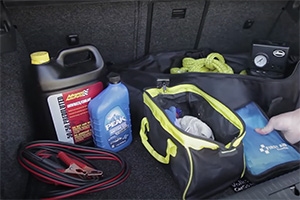 Number one on your to-do list is to keep your car well maintained and properly insured. It is a good idea to have a basic tool kit on hand, plus a set of spare fuses, a tire repair kit, at least one replacement bulb for each bulb type on your car, a replacement fan belt, and spare oil and air filter.
Number one on your to-do list is to keep your car well maintained and properly insured. It is a good idea to have a basic tool kit on hand, plus a set of spare fuses, a tire repair kit, at least one replacement bulb for each bulb type on your car, a replacement fan belt, and spare oil and air filter.
If you have the available space, carrying a collection of fluids for your car is also not a bad idea.
Gather up all the gear you figure you’ll need to live out of your car, and then try it for a night or two. This will show you what you’ve forgotten and what you do not need, before you need to do it for real. Depending on your skill level and mindset, your bug-out bag might be all that you require to live out of your car.
I like to think of it as setting up a car for camping, but on a more permanent basis.
Your Number One Priority
Safety must be your number one priority. Multiple hazards surround living in a car and you need to be ready for them.
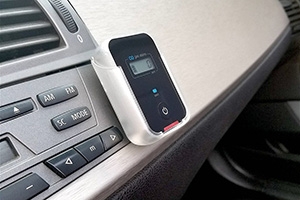 Carbon Monoxide is a concern whenever you sleep in an enclosed space, especially if you leave the engine idling. There are battery-operated CO detectors on the market and some that are specifically designed for vehicles. If you plan on living in a car for any length of time, a CO detector is indispensable.
Carbon Monoxide is a concern whenever you sleep in an enclosed space, especially if you leave the engine idling. There are battery-operated CO detectors on the market and some that are specifically designed for vehicles. If you plan on living in a car for any length of time, a CO detector is indispensable.
Since your car is now your home, you should keep all of your valuables, important documents, a change of clothes, toiletries, water, food, etc. in a backpack in case your car gets destroyed or stolen or you need to suddenly abandon it. This bag should be considered your ‘bailout bag’ and when you are not in the vehicle, it should be on your person and never left unattended.
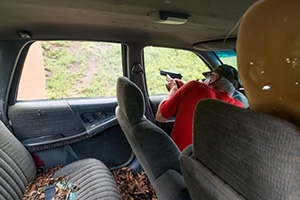 Lastly, you are vulnerable when sleeping in a car in an urban environment, and protecting yourself is critical. First and foremost, it is always best practice to disengage from a threat as your first line of defense. Remember that you are driving a two-tonne vehicle and escape is probably going to always be your best course of action.
Lastly, you are vulnerable when sleeping in a car in an urban environment, and protecting yourself is critical. First and foremost, it is always best practice to disengage from a threat as your first line of defense. Remember that you are driving a two-tonne vehicle and escape is probably going to always be your best course of action.
Second, remember that even though your car is now your home it is, after all, only ‘stuff’ and not worth grievous bodily harm or death in defending.
When given the choice between your life and your car choose the one where you keep breathing.
All this being said, you may be forced to defend your life, and in that case, you must choose methods that are legal in your area and that you have the training and temperament to execute effectively.
Storage
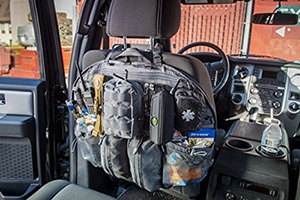 Open every door and the trunk of your car. Check each door for storage compartments, inspect where the spare tire is, glove box, center console, and the seat pockets. Once you’ve done this, plan out how you are going to outfit your car. Take into consideration how many people may be living with you as well.
Open every door and the trunk of your car. Check each door for storage compartments, inspect where the spare tire is, glove box, center console, and the seat pockets. Once you’ve done this, plan out how you are going to outfit your car. Take into consideration how many people may be living with you as well.
Keep items that you’ll need frequent access to in places like seatbacks and the pockets in the doors. Each person’s bailout bag should be compact enough to fit on the floor between their legs.
The trunk will be the primary storage area and you need to think about maximizing organization. Purchase containers with tight-fitting lids, that can be stacked one on top of the other. Try to find totes and containers that fit tight together to minimize the dead space between and around them.
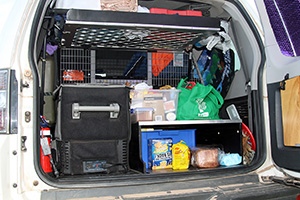 Label these containers with their contents so you can quickly find what you are looking for. Also keep similar items or items that serve similar purposes (cooking, cleaning, entertainment, sanitation, clothing, etc.) in the same containers.
Label these containers with their contents so you can quickly find what you are looking for. Also keep similar items or items that serve similar purposes (cooking, cleaning, entertainment, sanitation, clothing, etc.) in the same containers.
The area where the spare tire is often has a significant amount of room that you can store items that you may not frequently need ready access to. This is a good spot for tool kits and spare parts.
Keeping It Comfortable
Unless you have a truck or van, you’re going to find that sleeping in a car is not the lap of luxury. A small backpacking tent and air mattress will make your slumber far more comfortable where it is legal to pitch a tent.
Solar-powered fans that fit into the window of a vehicle are available. They will remove the hot air and hopefully bring in the cool air. Using sunshades on the windows will also help to keep it cool inside the car.
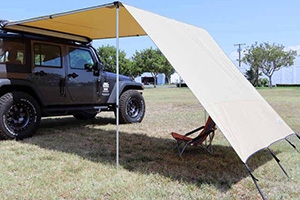
Try to park in shaded areas whenever it is possible. Otherwise, carry a tarp or two and some paracord and bungee cords to rig up some improvised shade when parked, or to create an outdoor space covered from the rain.
Related: Emergency Shelters When You Are On The Move
Number One for Survival
We need water to survive and it is important to have some on hand in your vehicle as well.
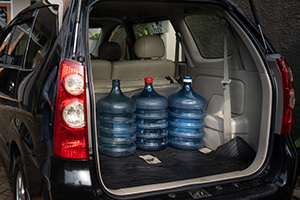
Fortunately, water is not hard to come by in urban environments, so keeping a 5-gallon jug with a spout in your trunk will be sufficient, provided you have free access to water.
Having a few reusable water bottles for each of the people living with you in the car is also a good idea. Use one bottle for water and the other for mixing sports drinks, juices, protein shakes, etc.
Cooking and Sanitation
You can not eat fast food for every meal, so you are going to have to do some cooking. A simple two-burner camp stove is portable enough for most vehicles and gives you the ability to cook a lot of meals. It is fairly simple to find pots and pans that nest together in your local camping supply store, as well as bowls that collapse flat, and cutlery.
Acquiring cookware that is designed for camping means that it will be lightweight and compact.
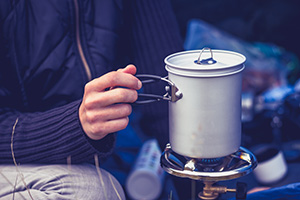 Sanitation is going to be an issue. In a pinch, you can use your camp stove to heat some water and use soap and a washcloth to give yourself a sponge bath. This is not a permanent solution though, so you are going to have to think about where the most accessible showers and washrooms are in your area.
Sanitation is going to be an issue. In a pinch, you can use your camp stove to heat some water and use soap and a washcloth to give yourself a sponge bath. This is not a permanent solution though, so you are going to have to think about where the most accessible showers and washrooms are in your area.
Remember that COVID-19 has shut down or put restrictions on places like community centers and gyms, where one would normally be able to shower. You can buy camp showers which are water bags with showerheads attached, or you can wash in rivers or lakes. Another option is to lean on your social network to find some friends or family that will allow you to use their washrooms to clean up.
Going to the bathroom at night is also an issue that you need to consider when sleeping in an urban environment. Parking outside a 24-hour Walmart or other retailers that have washrooms open to the public is one way to solve this issue. Failing this, an empty gallon jug is another option to store liquid waste, make sure to clearly label it and secure the lid tightly.
Navigation
GPS is omnipresent in 2020 and most of us have used either the onboard vehicle GPS or one of the handheld units. Every smartphone has GPS inside of it and Google Maps is amazing at getting you where you need to go.
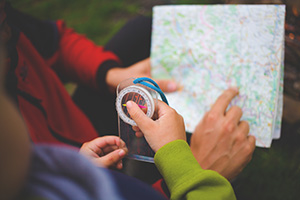 But you need to have some paper maps and a compass in your center console or glove box.
But you need to have some paper maps and a compass in your center console or glove box.
More importantly, you need to learn how to read and orient a paper map. While this seems like an archaic method of navigation, having a paper map or a map book helps you to understand how the different streets and neighborhoods relate to each other. After you’ve used a paper map for awhile, your ability to get around the city will dramatically improve.
I hail from a generation before smartphones and remember how a glance at a map book would have me navigating around traffic problems. With a little practice, you can become better at getting around a city or finding an address than Google could ever be.
Power
We live in an electronic age and even though you’re going to be living inside of what is effectively a two-tonne generator, you’ll want alternative ways to charge your devices while parked.
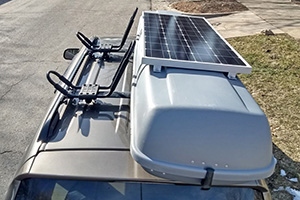 Large roll out solar panels can be laid out on the car roof to trickle charge battery packs or devices directly.
Large roll out solar panels can be laid out on the car roof to trickle charge battery packs or devices directly.
If your car is an older model and lacks USB ports for charging, there are power inverters available that plug into your car’s 12V power outlet that can provide hundreds of Watts of power.
Finding public Wi-Fi is also something that you’ll need to do to save on data charges. Some unlikely places to find some unsecured public Wi-Fi is businesses that serve the public, such as medical/dental offices, retail/grocery stores, coffee shops, etc.
Some people love to live out of their cars, but for most of us calling a vehicle “home” is almost always a result of some kind of catastrophe. While driving around with a car that is always ready to be home is not practical, having totes, containers and a bailout bag ready to load up is never a bad thing.

